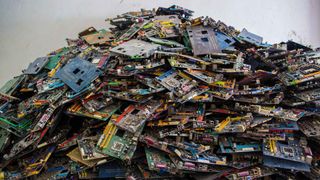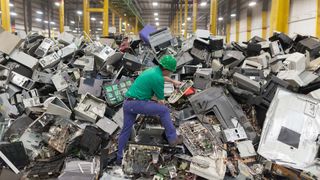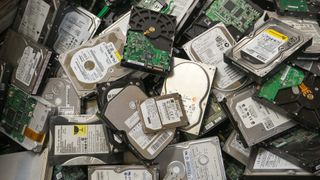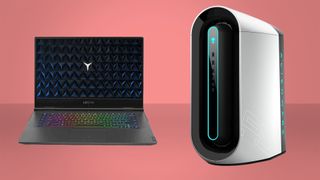You might be sitting on a mountain of e-waste that Dell wants to recycle for you
It might be time to let that old laptop in the back of your closet go.

If you're anything like me, you struggle to let go of your old electronics. Be that a mobile phone, laptop, or even an old graphics card plagued by electromigration and capable of a frame a minute—there's something about the act of disposing of it that feels inherently wasteful. Yet it's no less wasteful of me to keep my long redundant technology stored in a cardboard box at the back of my closet.
Hence when I spotted a tweet from Dell promising to recycle my old electronics— whether manufactured by Dell or not—it caught my attention. Will the company actually take my old tech from me and do something productive with it?
Recycling e-waste shouldn’t be a struggle. Box up your old or broken device of any brand, in any condition, and we’ll recycle it for free.♻️ https://t.co/ldV9W7mvwi pic.twitter.com/H1pngxkmHzAugust 4, 2021
To gather some more information, I reached out to the company. Because it's one thing to recycle your own product, it's a whole other to deal with somebody else's trash, for lack of a better word.
And as I would find out from Page Motes, Dell's head of sustainability, the company doesn't see it that way.
"We want to make sure as a large electronics manufacturer that we are doing our part to prevent e-waste ending up in any location that it shouldn't end up; number one," Motes tells me.
"Number two, we want to make sure that we are able to have individuals and groups that might need access to electronics, and especially through that take-back programme, provide more and more programmes to make that happen. And then number three, it is easier to know where your materials are coming from. It is a more cost effective process. It is also lower carbon footprint, lower use of water, all kinds of climate benefits, to reuse much of that material is possible."
No doubt there's an incredible quantity of e-waste produced yearly—made up of everything from plugs and cables to PCs and phones. And what makes modern technology especially wasteful is all the irreplaceable and non-renewable resources, including precious metals, that go into building it.
The biggest gaming news, reviews and hardware deals
Keep up to date with the most important stories and the best deals, as picked by the PC Gamer team.
The kind of stuff that can so easily end up in a landfill while someone else goes to great trouble to dig more of it out of the ground.
"Mining these things has a whole series of risks and complexities not just environmental, but human," Motes says.

Dell sees that e-waste instead as an opportunity to create closed-loop supply for certain materials.
Plastics are something the company has been recycling for some time now, using 100 million pounds of the stuff to make new parts for Dell systems, but more recently it's also begun leveraging rare earth magnets from old, disused hard drives alongside manufacturer Seagate.
Furthermore, I'm told Dell is now reusing aluminium from the old drives, and this closed-loop aluminium has since found its way into the Optiplex lineup, a range of commercial PCs that probably aren't all that familiar to PC gamers but relies on recycled materials for a large part of its construction. Something it'd be great to see make its way into more discrete PC gaming components, that's for sure.
Dell is first to admit it benefits from the program, and it also hopes that might tempt other companies to follow in its footsteps. Motes explains that it's well-aware this is not something that can be done alone, and that it'll need wider support for recycling programs to really deal with the e-waste generated every year that is, for the most part, not recycled or reused.
A lot of this we feel like we've got to do locking arms with other like minded organisations.
Page Motes
"How do we make the supply chain process better? How do we document this better? How do we evaluate effectiveness? What are the right metrics? How do we get public procurers or even consumers and commercial organisations to demand more circular products? Right?" Mote says. "So a lot of this we feel like we've got to do locking arms with other like minded organisations."
"Dell can't do it alone, we would be far too arrogant to think we could," Motes continues.
And it has to convince you, too. I started this article admitting I don't easily part with my old electronics, and apparently I'm not alone.


Best gaming PC: the top pre-built machines from the pros
Best gaming laptop: perfect notebooks for mobile gaming
"There was a study done focusing in one of the Nordic countries, because in the Nordics, they are very, very, very focused on this concept of recycling and upcycling. And even in those countries, what they found is that there is this hesitancy still to turn things in," Motes says. "So we are trying to conduct some research right now. We are having some surveys and conversations with customers to try to understand trends and analysis of what stops people."
"But it really is that kind of human piece that we like to hold on to things a little bit longer sometimes, especially when so much of our life has been on it."
So we need to learn to let go, too. There are plenty of ways to do that, at least: be it through a take-back program like Dell's (which you can check out here), and there are others like it; or even your local waste authority. Plenty of councils in the UK will recycle your old tech, for example.
In any case it's always good to find out where it'll end up before throwing your half-wiped laptop into a public bin. Not the least bit to ensure it's recycled as effectively as it could be. Best case scenario that e-waste ends up with an electronic disposition provider that can accurately weigh up whether it's truly headed for scrap or if it can be refurbished and reused someplace else. Nine times out of 10, it'll be refurbished, Motes tells me.
Which just goes to show how one person's trash is another person's treasure—even your old Pentium-powered PC with a handful of half-knackered hard drives.

Jacob earned his first byline writing for his own tech blog. From there, he graduated to professionally breaking things as hardware writer at PCGamesN, and would go on to run the team as hardware editor. He joined PC Gamer's top staff as senior hardware editor before becoming managing editor of the hardware team, and you'll now find him reporting on the latest developments in the technology and gaming industries and testing the newest PC components.
Most Popular

